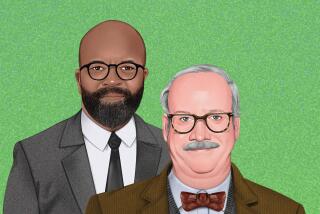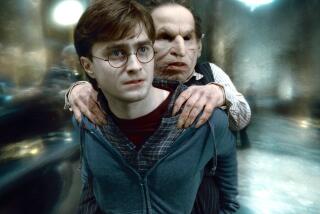Handling a gem of a role with a craftsman’s delicate touch
- Share via
RICHARD GRIFFITHS is probably best known to audiences as Harry Potter’s loathsome Uncle Vernon. The veteran British actor traveled to the other end of the spectrum to create the deeply sympathetic character of Hector, a devoted teacher with a tragic flaw, in both the stage and screen versions of “The History Boys.”
“He’s desperately complex,” Griffiths said of Hector. “I thought of him as an unset diamond. If you ever see a cut diamond outside of a setting, and turn it in a hard light, you will see facets twinkle, and if you turn it a thousandth of a degree, new facets. Every scene to me was like turning a diamond and revealing to the audience a new facet ... the boys all think he’s a silly old doffer, this dumb, old fat guy, because Hector has almost hidden his genius by being light and comedic and throwing it away. But actually if you knew the stuff he was talking about, you realize that only somebody with that kind of master’s grasp of the subject and an intellect to match could use it like that.”
Griffiths’ grasp of the role was equally masterful. “It’s the delicacy and detail with which he works,” offered director Nicholas Hytner. “He’s the least demonstrative of actors, but he has such a graceful way of revealing an emotional subtext.”
In one particularly compelling scene, Hector and Posner, a student played by Samuel Barnett, analyze a poem by Thomas Hardy. In the process, both end up revealing their loneliness.
“Richard works with such precision, such delicacy,” said Hytner. “Rather than kind of roaring his pain, he suggests it through the most delicate brushstrokes, and that in combination with his physical size is so unexpected and so graceful.”
Barnett noted that his own skills as an actor improved from working with Griffiths and Frances de la Tour, who plays Mrs. Lintott, the boys’ more conventional history teacher. “Watching Richard and Frances on stage for nearly three years, I feel I’ve got much better comic timing. I know how to deliver a line without playing for the laugh. I know how to do a show 500 times and keep it as fresh as Day One.”
The admiration was mutual it seems, hearing Griffiths talk of the young actors portraying the students. “You get pretty burned out after 30 years of doing this stuff. And then you remember that you have to have a certain degree of fire in your belly to make it exciting for the audience,” Griffiths, 59, said. “Energy is not just loud voices and rapid action -- although dear Lord, I wish I was capable of both -- it’s to do with being fascinated and passionate about something. And they certainly gave that up in abundance. Everybody was invigorated being around them.”
For his stage performance, Griffiths was duly lauded in both England and New York -- winning eight awards, more than from the rest of his career combined. It was a pleasant surprise for the actor, who had stopped paying attention to such things.
“I have to say the [last] time I really invested my hopes in an award was in 1979,” Griffiths said. (He was referring to his role in “Once in a Lifetime,” and a shot at an Evening Standard Theatre Award.) “I didn’t get it, and I was gutted. The disappointment clung on me like a cloak for decades.
“I figured that my face didn’t fit, I was too fat, I was unfashionable. I was never going to get it for those reasons anyway, so what the hell, forget that, carry on.”
He concentrated on the work. “All that was important to me was to have a job, pay your way, meet your overhead and keep going. Which is the life of most actors,” he said. Thanks to the awards, especially the Tony for best leading actor in a play, “suddenly people seem to understand what I’m doing, which is deeply pleasing. Basically it’s just a world of adversity out there for the working schnook. But now this thing has happened, and I’m just able to expand the horizon a bit.”
-- Lisa Rosen
More to Read
Only good movies
Get the Indie Focus newsletter, Mark Olsen's weekly guide to the world of cinema.
You may occasionally receive promotional content from the Los Angeles Times.










